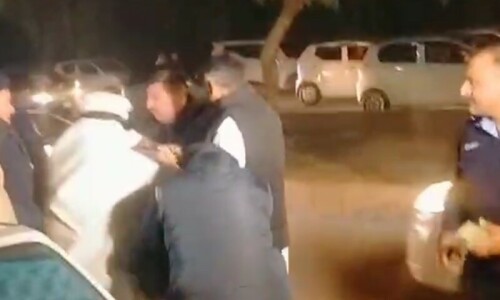 BERLIN, March 5: Strikes brought transport chaos to Germany on Wednesday as airport workers joined industrial action by other service industry staff, causing cancellations and long delays at airports around the country.
BERLIN, March 5: Strikes brought transport chaos to Germany on Wednesday as airport workers joined industrial action by other service industry staff, causing cancellations and long delays at airports around the country.
The airports affected included those in Hamburg and Hanover in the north, Munich in the south and Stuttgart, Duesseldorf, Dortmund, Cologne and Frankfurt in the west.
The national carrier Lufthansa had cancelled 142 flights, mostly on domestic routes, in anticipation of the stay-away by members of the Verdi trade union and the police union, GDP.
In Berlin, airports functioned normally but commuters battled to get to work as employees of the BVG public transport service also went on strike in support of wage demands, adding another labour conflict to that led by Verdi since mid-February.
The BVG strike brought trams, buses and underground trains to a standstill.
It looks set to continue until March 14 at least and could bedevil Germany’s five-day ITB tourism fair opening in the capital on Wednesday.
In the meanwhile, the GDL train drivers’ union threatened to resume strikes nationwide from next week in a protracted dispute with the state-owned rail provider Deutsche Bahn, raising the spectre of greater transport disruptions still.
The hard line taken by GDL, which has called a series of strikes since last summer, and by Verdi is seen as a sign that German trade unions are increasingly reluctant to cede ground in labour disputes.
Verdi called on its members to strike after a third round of wage talks with government officials on behalf of 1.3 million civil servants broke down last week.
It has been trying to secure salary increases of eight per cent or a minimum of 200 euros ($300) per month. Authorities have proposed a five per cent increase over two years, along with an extension of the work week from 38.5 hours to 40 hours.
The civil service strike was centred on Wednesday on North-Rhine Westphalia, the country’s most populous state, where the union said 67,000 workers would stop work, crippling public transport as well as hospitals and day care centres in Cologne and Duesseldorf.
The trade union warned that Thursday would see major work stoppages in the states of Hesse, in the west, and Baden-Wuerttemberg, in the south-west.
“We have no choice,” said the head of Verdi’s operations in Hesse, Juergen Bothner.
Hospitals and clinics as well as garbage removal services have been affected in other cities earlier this week.
Verdi and government officials were due to resume negotiations on Thursday in the eastern city of Potsdam.
“It’s the last chance to find a solution,” said Leni Breymaier, Verdi’s regional chief in Baden-Wuerttemberg.
The Hans-Boeckler foundation, which is seen as being close to the trade unions, has said that workers have not been allowed to share in the fruits of the German economic recovery that got into swing in late 2004.
Since then, wages have shown a real decrease of 3.5 per cent, it said.
Workers’ frustration and the perception the wealth gap has grown wider in Germany — underscored by a study showing the country’s middle class has shrunk — appears to have helped erode a tradition of settling wage conflicts at the negotiating table rather than in the street.
Further adding to the climate of conflict, is that Verdi, one of Europe’s biggest trade unions, fears losing more members after pilots and doctors left its ranks.
“This is why Verdi is taking more aggressive action,” Hagen Lesch from the IW economics institute in Cologne said.
He said warning strikes like those seen this week have become “a marketing strategy” employed by unions to recruit new members.
The strikes come amid Germany’s biggest ever tax evasion scandal, which could embroil up to 600 members of the elite holding bank accounts in Liechtenstein, and the rise of a far-left political party grouping former East German communists and disenchanted Social Democrats.
The tax scandal has heightened unhappiness over the wealth gap, with striking workers last month holding up banners proclaiming “we also want to invest in Liechtenstein.”—AFP














































Dear visitor, the comments section is undergoing an overhaul and will return soon.